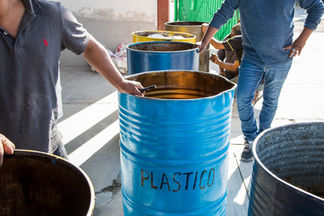In most parts of Mexico, poor waste management and lack of recycling culture is still a very diffuse problem. Despite the fact the country is recognized worldwide for its recycling products made from PET, statistics are very discouraging. Only 17% of Mexico has an efficient waste management system showing that there’s still a lot to do before reaching the numbers of other countries.
The negative impact that this fact has on the environment is very high since most of toxic wastes end up polluting air, rivers and oceans.
While around major cities garbage gets collected in landfills, in remote areas families still have the habit to burn their own wastes increasing this way the amount of air pollution.
Furthermore, majority of landfills in Mexico are managed by private companies that promise to implement better technology, but if the authorities do not monitor the operations, the waste management still ends up being harmful for the surrounding communities.
The state of Oaxaca is one of the poorest of the country when it comes on waste management.
Neither the city of Oaxaca nor the villages of the surrounding area have a proper public waste recollection system. The community of Mitla is the only recycling point of the area and apart for recollecting the wastes of the village, only few private companies can have access to the landfill cutting out majority of the communities.
Abigail Lopez Ramirez, born in Tlacolula, currently works for the Health System in Union Zapata as rural assistant. Her role mainly consists of villagers orientations for topics such as nutrition, use of water, epidemics, illnesses and prevention.
She’s also trained to give basic first aid intervention and she s currently a bridge between the Hospital and the community, managing the registers and the personal files of the patients.
When met her to discuss about the previous situation in the waste management of Union Zapata she asserted that her attempts to bring the recycling system in the community had been going on for more than 10 years without any positive results.
The main reasons were the general lack of recycling knowledge within the people, lack of recollection system within the community itself and finally lack of support of the authorities of Mitla who refused the access to the landfill,.
What recently finally changed the situation has been the presence of AHAH working at close contact with the community in the two schools, primary and kindergarden, and the example given by the organization in the recycling process.
This fact lit interest and curiosity and opened a door to a very important change that have been really difficult til that moment.
Few weeks before the end of the AHAH project, teachers of the primary school and several members of the community reunited to organize and distribute the recycling bins around the village and to do a general orientation on recycling.
“Lot of women now realize the importance of this change” affirms Abigail “especially when it comes on finally having a place where diapers and plastic can be thrown away instead of having to burn it”.
While previously the recollection of plastic was done once a year, now, thanks to the intervention of Abigail with the support of AHAH, the members of the community in a rotatory system bring a track with all the separate wastes to the landfill once a week.
“This is considered to be a big step for a community that has never been used to separate waste. A lot of work still has to be done to reach a sustainable system that supports a circular economy able to cover the costs but the progress and the interest is reassuring.” Said finally Abigail, “And the impact that AHAH had on the community has been incredible and certainly long to be remembered.”














